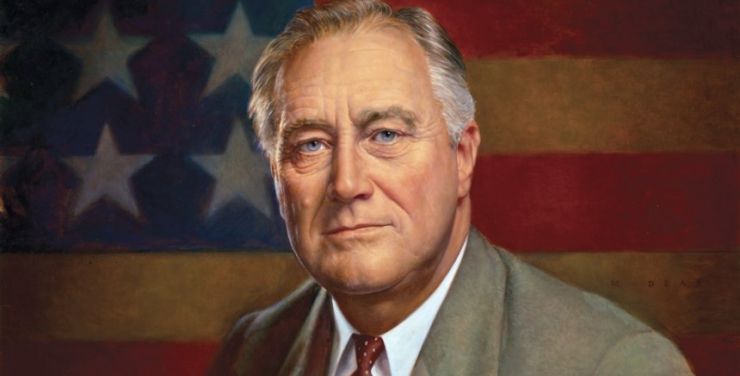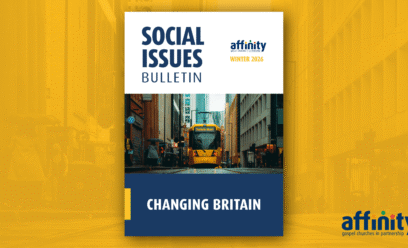“We have nothing to fear but fear itself”

Affinity council member Paul Yeulett, pastor of Grove Chapel, Camberwell in London, recently shared this meditation on a famous saying with his church congregation. We have his permission to reproduce the text below. Or you may view him speaking about it here.
‘We have nothing to fear but fear itself’. Have you heard words like these before? They are attributed to US President Franklin D. Roosevelt, one of the great statesmen of world history, and it is often assumed that he spoke them immediately after the Imperial Japanese Navy Air Service had attacked Pearl Harbor on 7 December 1941.
In actual fact, Roosevelt – paralyzed from the waist down since 1921 – spoke these words, or very similar words, nearly nine years earlier, at his first Presidential Inauguration on 4 March 1933. The circumstances in which Roosevelt spoke were perilous, in some ways far more perilous than the entry of the United States into World War Two. The nation was passing through the bleakest and most desperate months of the Great Depression. The whole paragraph is worth quoting in full:
And I am certain that on this day my fellow Americans expect that on my induction into the Presidency I will address them with a candor and a decision which the present situation of our people impels. This is pre-eminently the time to speak the truth, the whole truth, frankly and boldly. Nor need we shrink from honestly facing conditions in our country today. This great Nation will endure as it has endured, will revive and will prosper. So, first of all, let me assert my firm belief that the only thing we have to fear is … fear itself – nameless, unreasoning, unjustified terror which paralyzes needed efforts to convert retreat into advance. In every dark hour of our national life a leadership of frankness and of vigor has met with that understanding and support of the people themselves which is essential to victory. And I am convinced that you will again give that support to leadership in these critical days.
A number of comparisons of the COVID-19 crisis with world wars or great depressions have been made, although some people have questioned whether they are really useful. Indeed, as this present crisis continues and deepens we increasingly see, paradoxically, how little we know about the character of this new disease, and even less about how to combat its effects. There is a very valuable spiritual lesson here for us, of course; we must recognise our creaturely frailty and ignorance, and cry out to our Creator from a sense of needy dependence.
But Roosevelt’s words undoubtedly speak to our times. And biblical Christians, above all people, need to face up to the reality of this fear. Fear itself is a much greater menace to us than COVID-19 or any other disease.
This is related to a question which has been much discussed in recent weeks: is the sudden appearance of this virus a judgment from God? A number of commentators have been very quick to either affirm or to deny this suggestion. Some have described the coronavirus pandemic as a warning, and have referred to the two disasters mentioned in Luke 13:1-5 – the massacre of Galileans by Pilate and the collapse of the Tower of Siloam – in response to both of these Jesus said ‘unless you repent, you will all likewise perish.’
These comparisons are of course valid and useful. But I think we can say even more. God’s judgment is both a present reality and a future event (Rom. 2:2-5). He does not delay enacting his judgment until the final Day; he carries out judgments in the earth throughout history, whether more or less obviously. This is clear from the whole Biblical narrative, and the essential character of God has not changed since Biblical times. God is, by his very nature, a God of judgment. Psalm 105:7 tells us that ‘He is the LORD our God; his judgments are in all the earth.’ This is a statement of what God is all the time, rather than a description of how God acted at a specific point in human history.
In Judges 3:1-2 we read about the circumstances which prevailed in Israel after the death of Joshua:
Now these are the nations that the LORD left, to test Israel by them, that is, all in Israel who had not experienced all the wars in Canaan. It was only in order that the generations of the people of Israel might know war, to teach war to those who had not known it before.
Do these verses contain any application for us today? I suggest that there may be useful lessons here. Might it be that the generations of 2020 need to ‘know war’? Perhaps not ‘war’ in the literal or conventional sense – and the character of today’s warfare would in any case be quite different to the warfare of World War Two, or of more recent years – but to learn how to face hardship, adversity and privation of a kind that has, perhaps, not been experienced since the world wars of the twentieth century, at least not in the increasingly affluent and self-indulgent western world?
Over the last six or seven weeks we have been plunged into a strange new world, though perhaps not a very brave new world. We hear a great deal being said about a ‘new normal’ which will establish itself as a result of COVID-19. Even if a successful vaccine were to be made available within a year or so, the impression is given from some quarters that certain changes, especially in relation to social distancing, might be here to stay. Some journalists have written about ‘Lockdown Syndrome’, a growing sense not only of toleration and acceptance of present restrictions, but a kind of enjoyment of them, and indeed a fear of them being lifted. For some people it is more comfortable to hide behind masks and screens than to bare our faces and our souls to one another.
How should Bible-believing Christians respond to all this? We need to agree, of course, that masks and screens, and other means, may well be necessary measures – for a time. If I need to travel by bus or tube, and the wearing of a mask is likely to protect other people’s health as well as my own, then I should wear a mask. And while a significant number of people need to be shielded from a genuine risk of catching the disease in a venue such as a church building, then it is humane and altogether sensible to insist that virtual church ‘services’ should be live-streamed or recorded, rather than take place in a physical meeting-space with a physical congregation.
But these restrictions should only be for a time, for as long as they are deemed necessary. This is true of church services but also of many other human activities. The prolonged imposition of any ‘lockdown’ will have a detrimental effect not only on a country’s economy but on its health – physical, mental and emotional. And it will contribute to a generation characterised by fear – by fear of fear itself rather than something more identifiable and tangible. Roosevelt had observed this fear in the depression-stricken America of the 1930s – we need to be alert to it in our present situation.
Surely this generation of Christians needs to relearn the most important lessons about fear – that is, both misplaced fear and appropriate fear. The striking words of the Lord Jesus himself, in Matthew 10:28, come very readily to mind: ‘And do not fear those who kill the body but cannot kill the soul. Rather fear him who can destroy both soul and body in hell.’
We ought not to fear COVID-19 or any other disease. Yes, we should be wary of it and employ sensible precautions, as we would if we were crossing a busy road, or trying to deal with a hornets’ nest. We know that this disease harms; yes, we know very well that this disease kills. But we ought not to fear it in the sense that we let it determine the overall shape of human life and activity. We ought not to let the fear of COVID-19 morph into a more general fear – what Roosevelt called the ‘nameless, unreasoning, unjustified terror which paralyzes needed efforts to convert retreat into advance.’ We ought to anticipate and work towards a time, sooner rather than later, when a reassuring normality will again characterise our work, socialising, education, leisure, travel … and most certainly our worship.
No, instead we should fear the one who holds power over both body and soul – God himself. Is there a more important lesson for Christians and for churches than this, now or at any other time? ‘The fear of the LORD is the beginning of …’ both ‘wisdom’ (Psa. 111:10, Pro. 9:10) and ‘knowledge’ (Pro. 1:7). How foundational is ‘the fear of the LORD’ to the whole Christian life? Nothing is more central in our approach to God. The LORD told Moses, at the burning bush, ‘Do not come near; take your sandals off your feet, for the place on which you are standing is holy ground.’ (Ex. 3:5) And Isaiah prophesied, centuries later, ‘this is the one to whom I will look: he who is humble and contrite in spirit and trembles at my word’ (Isa. 66:2).
May God himself hasten the day when churches are again filled with people, filled with praise, filled with the fear of the LORD, and filled with humble souls who have been gathered into the kingdom of God!
Paul Yeulett, Pastor, Grove Chapel
Stay connected with our monthly update
Sign up to receive the latest news from Affinity and our members, delivered straight to your inbox once a month.



